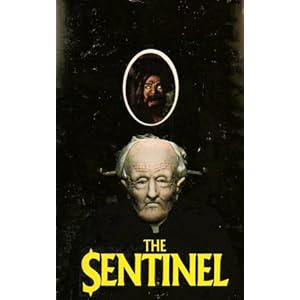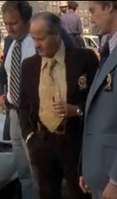The Sentinel
Directed by Michael Winner
Written by Jeffrey Konvitz and Michael Winner (based on Konvitz’s novel)
Starring Cristina Raines, Chris Sarandon, Burgess Meredith, Arthur Kennedy, John Carradine, Ava Gardner, Deborah Raffin, Eli Wallach, Martin Balsam, José Ferrer, Sylvia Miles, Christopher Walken, Jerry Orbach, Beverly D’Angelo
Satan was big in the 1970s. He got his first big taste of mainstream movie stardom in Roman Polanski’s Rosemary’s Baby in 1968, but it was the runaway success of William Friedkin’s brilliant The Exorcist in 1973 that really kicked Old Scratch’s movie career into high gear. Richard Donner’s The Omen (1976) would continue the trend; though not in the same league as The Exorcist, it was a solid enough big-budget movie that you didn’t feel like Gregory Peck and Lee Remick were slumming.
And then comes The Sentinel. I don’t remember the movie coming out, but I do remember the paperback reprint of the book staring out from every grocery store wire rack:

Even then it looked to be part of the first wave of mass market horror dreck rushed to print in the wake of the success of The Exorcist (both in print and on-screen).
So I had very low expectations for the movie adaptation when we queued it up for holiday viewing. Fortunately, it was better than I thought it would be, turning out to be only mediocre rather than utter crap. (Hurray for low expectations!) It has a few unexpected twists and a dynamite supporting cast that skims the best of three generations of Hollywood character actors. However, it’s easily the weakest of the big budget Catholic Devil films of the era, far inferior to not only The Exorcist, but also Rosemary’s Baby and The Omen.
Like The Exorcist and The Omen, the film has a cold open in a foreign clime, in this case Italy, with a mysterious conclave of Catholic officials, which ends up not telling us a damn thing.
Back in New York City, Cristina Raines (sort of a poor man’s Kate Jackson) plays Alison, a model looking for an apartment because she “needs some space” (I did say it was the 70s) from her lawyer boyfriend (a very young Chris Sarandon skillfully walking the line between sympathetic and oily). How was she to know the apartment building she choose was a Hellmouth?
Well, the fact she found a large, furnished apartment with a water view for $400 was the first hint. (Today if you advertised an NYC apartment that big at that price, you could probably get takers even if you told them it’s a Hellsmouth. “Sure, the walls drip blood. But look at all this room!”) The freaky neighbors were another, including an overly cheerful Burgess Meredith, two lesbians sharing an apartment (one of whom, a silent Beverly D’Angelo, “Jill’s off” in front of her), and the blind recluse of a priest in the top apartment. Then comes the disturbing noises and bumps above her room at night. And the strange birthday party for Meredith’s cat.
Outside her apartment things aren’t much better. Her father dies, leading to a strange flashback of her coming home in her Catholic schoolgirl uniform, him cavorting with hookers, slapping her, and then her attempting to slit her wrists, which seems a rather drastic response. (I mean, couldn’t she just start dressing in black and listening to punk rock?) She’s fainting during her modeling gigs and on some sort of drugs. (I did say it was the 70s.)
However, things take a truly weird turn when the agent that rented the apartment to her reveals that all the flats but her’s and the priest’s are vacant, taking her on a tour of cobwebbed suites she had seen occupied the day before.
At this point the movie is starting to resemble Gaslight more than your average Satanic shocker. Is she really living on a Hellmouth? Is she just seeing things? Is it the drugs? It takes a twist back to horror land when, back in her apartment (yeah, she’s a moron) she hears more groaning and bumping above her, at which point she undertakes the only course of action available to a horror movie heroine in this situation: Go up to confront it in her negligee with a flashlight and a knife. And who should be there but her dead father, who she promptly stabs before running screaming into the street and covered with blood.
After that there’s even more weird twists, featuring two policemen (Eli Wallach, sporting the widest tie in cinema history, along with young Christopher Walken) investigating, visits to churches, lawyer boyfriend hiring a detective who disappears, a bit of written glossolalia on the part of Alison (ancient Latin, natch), and the usual plea to kept her under constant observation while he goes to Confront the Evil. You can probably figure out how well that works out.
And in case you think I was exaggerating about Eli Wallach’s tie:
It does turn back into a full-blown Hellsmouth movie about five minutes before the end, with a suitably creepy (if depressing) climax.
Here’s the trailer, which includes a goodly portion of the climax cut into little pieces, and actually makes the film seem like a bit more of a generic horror film than it actually is:
Despite the solid supporting roles, the film falls flat compared to its demonic brethren largely due to the talent on the other side of the camera. The Exorcist and Rosemary’s Baby featured great directors at or near the top of their game and solid screenplay adaptions of famous horror novels. Michael Winner, most famous for directing Death Wish (I, II and III) is not in that league. When Friedkin deployed the gore, it was all the more effective due to his naturalistic restraint earlier in the film. By contrast, Winner seems to reach for the sleaze pretty early, including possibly the last mainstream American film where lesbianism was intended to be a sign of moral turpitude rather than easy titillation. There’s plenty of female nudity, most of it deeply unerotic. The film has more gore than its predecessors (possibly a linear extrapolation per year), but not enough to satisfy a real gore hound. Otherwise the direction and cinematography are workmanlike.
The resume for writer Jeffrey Konvitz (adapting his own novel) is even thinner, with Silent Night, Bloody Night (not to be confused with the far more infamous, but no doubt equally crappy, Silent Night, Deadly Night) and Gorp being his only other screenplay credits. As a producer he did slightly better, with Spy Hard as his most notable film. The Sentinel probably comes in at the very top of his extremely limited resume.
The Exorcist had a solid grasp on Catholic doctrine, while The Omen had enough of one to make the plot go. The theology in The Sentinel seems loosely based on other films and horror novels and is never fleshed out enough to actually make sense. Also, in the film it becomes apparent that Alison has been Chosen, but the mechanism doesn’t make any sense. What if she never called back this particular apartment agent? Burgess Meredith’s role doesn’t really make sense. Is he a quirky neighbor? Satan? Something else? He seems as ill-defined as the rules under which Good opposes Evil. And pretty much every actor in it has done better work.
Still, the climax is nicely creepy. The film handles the “Is She Crazy or Is It Satan” question better than you think it would. It was pretty much the last mainstream horror film featuring Satan in the big city (it would soon go suburban and then rural, and then either disappear off the list of standard horror cliches entirely, go to indy films, or mutate into something else (the cenobites in Hellraiser do not come out of the Catholic demonic tradition), before staging a mild comeback thanks to remake fever. There’s lots scarier and more interesting horror fare available; this is mainly a curiosity for those who have already seen the other Hollywood horror films of the 1970s.
I can’t find box office records for the film, indicating it wasn’t particularly successful; it didn’t make as much money as that year’s other Satanic film Exorcist II: The Heretic, which raked in $30.7 million. (The top film that year was Star Wars, which you might have heard of.)
And it looks like someone has posted the entire movie online, if you’re really curious:
Tags: Burgess Meredith, Chris Sarandon, Christopher Walken, Cristina Raines, Halloween, Horror, movie reviews, Movies, The Sentinel, video

[…] the meantime, Lawrence has a review of “The Sentinel” up at his place. I watched it with him and some other folks (thanks for hosting, people whose identities I wish to […]
[…] I digress. The major point here is that “The Little Black Bag” features our old friend Burgess Meredith again. I knew he was a prolific actor, but it seems like he’s showing up everywhere these […]
[…] He also directed Won Ton Ton: The Dog Who Saved Hollywood, a version of The Big Sleep with Robert Mitchum as Marlowe and set in England instead of L.A., and (the reason Lawrence brought him up), The Sentinal. […]